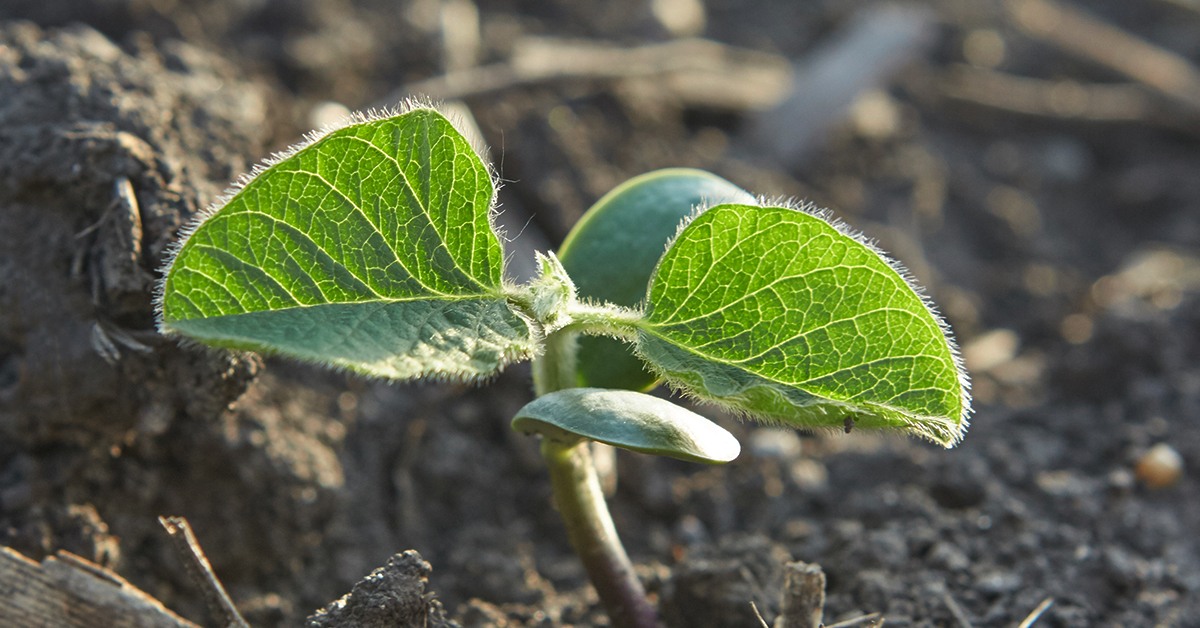Inoculation is critical for managing saturated or flooded soybean fields
Consider a biofungicide inoculant for extended root disease protection

Each year, many parts of the U.S. experience excessive rainfall, flooding or extended periods of saturated soils. These wet soybean acres experience a significant reduction in the critically important, nitrogen-fixing rhizobia bacteria. Rhizobia are bacteria that, after becoming established inside the soybean root nodules, enable soybeans to fix nitrogen from the atmosphere and make it available to the plants.
“Around 60% of the total nitrogen used to produce soybeans comes from their symbiotic relationship with the root nodule,” said Justin Clark, BASF Technical Field Manager. “Soybeans capture the atmospheric nitrogen, store it and convert it into a usable form. They can then turn that nitrogen into plant nutrients, which increases yield.”
Any flooded fields, or fields that have experienced flooding or waterlogged conditions in the previous year, are particularly vulnerable to rhizobia loss since flooding or standing water in fields can create an anaerobic soil environment which can kill soil rhizobia in as little as three to seven days.
“In order to maximize the yield potential of these fields, soybean growers need to seriously consider including the application of a rhizobia-containing inoculant to their soybean seed, such as Vault® HP plus Integral® biological seed treatment,” said Clark. “To maximize that yield potential, you need as many of those bacteria in the soil as possible.”
For maximum nitrogen fixation and improved yield potential, Vault HP plus Integral biofungicide is formulated with rhizobia, produced fresh for each growing season. It is a highly effective Bradyrhizobium japonicum produced with a minimum guaranteed count of 10 billion colony forming units (CFUs) of rhizobia per mL through product expiration. Vault HP plus Integral biofungicide also stimulates rhizobia after planting for improved root nodulation and extended on-seed survival.
Extended root disease protection
Wet soils can also cause other production problems for growers as the condition creates a potential favorable environment for the development of seedling diseases.
Unlike many other soybean inoculant products on the market today, Vault HP plus Integral biofungicide includes an EPA-registered biological fungicide component. The Integral biofungicide complements any other seed-applied systemic fungicides to help significantly extend protection from Fusarium and Rhizoctonia, resulting in healthier roots with more potential nodule-formation sites and improved nutrient uptake.
In nearly 300 yield tests from across the country over the past eight years, Vault HP plus Integral biofungicide has averaged a 2 bushel per acre yield advantage over soybeans that did not receive an inoculant treatment and has delivered about a half bushel more per acre than the key competitive inoculant treatments.1
If growers experience conditions that reduce rhizobia populations while increasing disease pressure, and don’t inoculate their soybean seed, they could be sacrificing significant yield and profit potential. Inoculating soybean seed can improve nitrogen fixation and potential yields, making it a good soybean crop input management decision every year.
“A lot of growers across the U.S. have had those flooded and ponded sites, and we are reminding growers to use an inoculant to better ensure solid yields come harvest,” said Clark.
Whether soil conditions are normal, wet or cool, Vault HP plus Integral biofungicide helps give growers the opportunity for more yield potential from every acre each growing season. To learn more, please visit agproducts.basf.com or talk to your local BASF representative.
1 Data used from 2010-2018 Vault HP plus Integral biological seed treatment commercial market support trials.
Always read and follow label instructions.
Vault and Integral are registered trademarks of BASF. © 2020 BASF Corporation. All rights reserved.
About BASF’s Agricultural Solutions division
With a rapidly growing population, the world is increasingly dependent on our ability to develop and maintain sustainable agriculture and healthy environments. Working with farmers, agricultural professionals, pest management experts and others, it is our role to help make this possible. That’s why we invest in a strong R&D pipeline and broad portfolio, including seeds and traits, chemical and biological crop protection, soil management, plant health, pest control and digital farming. With expert teams in the lab, field, office and in production, we connect innovative thinking and down-to-earth action to create real world ideas that work – for farmers, society and the planet. In 2019, our division generated sales of €7.8 billion. For more information, please visit www.agriculture.basf.com or any of our social media channels.
About BASF
BASF Corporation, headquartered in Florham Park, New Jersey, is the North American affiliate of BASF SE, Ludwigshafen, Germany. BASF has more than 20,000 employees in North America and had sales of $19.7 billion in 2018. For more information about BASF’s North American operations, visit www.basf.com.
At BASF, we create chemistry for a sustainable future. We combine economic success with environmental protection and social responsibility. The approximately 122,000 employees in the BASF Group work on contributing to the success of our customers in nearly all sectors and almost every country in the world. Our portfolio is organized into six segments: Chemicals, Materials, Industrial Solutions, Surface Technologies, Nutrition & Care and Agricultural Solutions. BASF generated sales of around €63 billion in 2018. BASF shares are traded on the stock exchange in Frankfurt (BAS) and as American Depositary Receipts (BASFY) in the U.S. Further information at www.basf.com.
